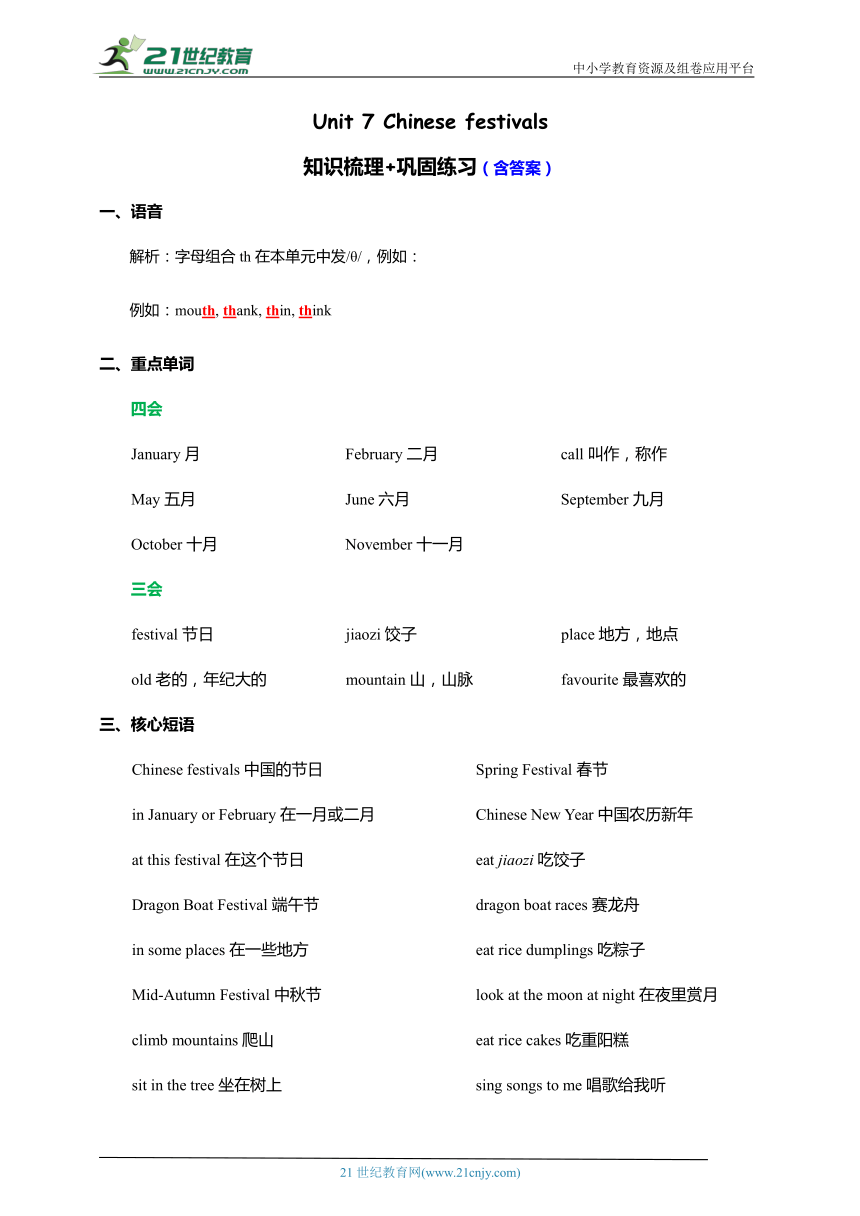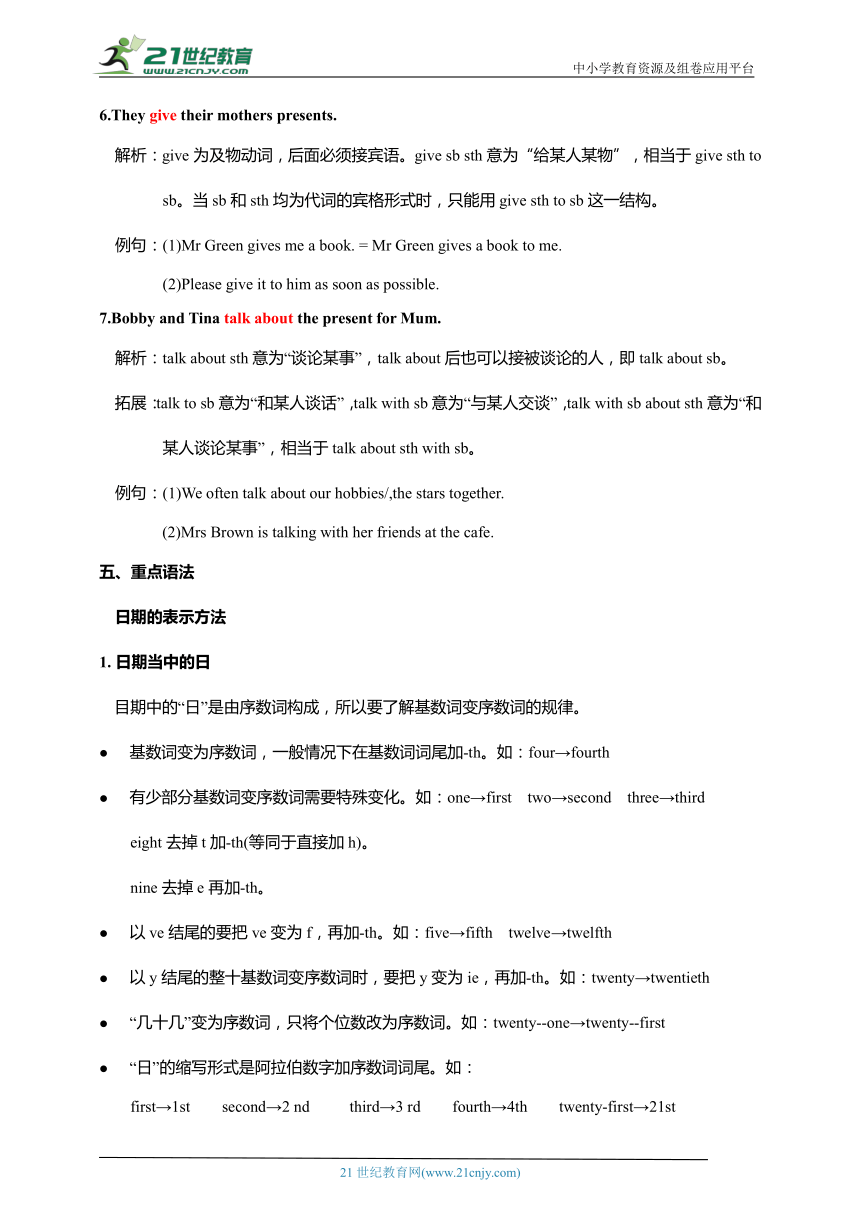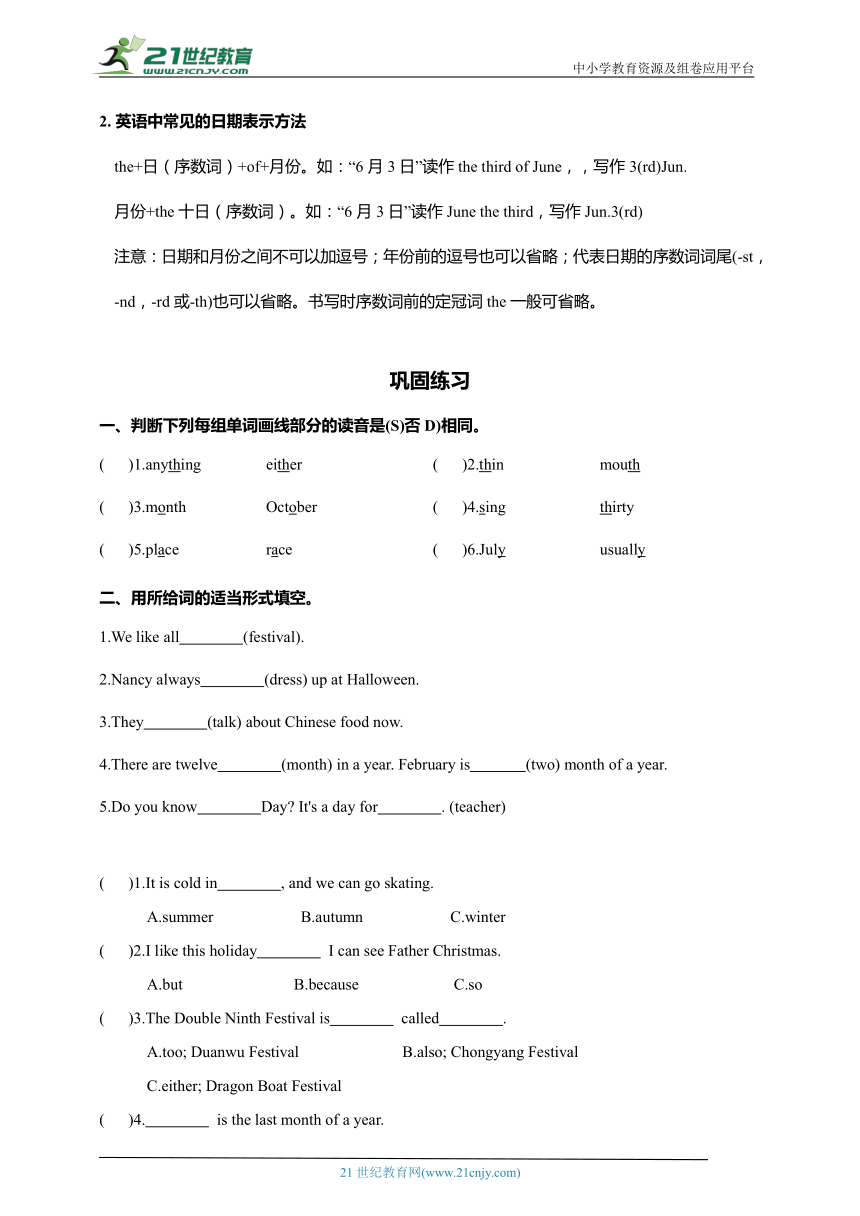【期末总复习】Unit 7 Chinese festivals知识梳理+巩固练习(含答案)
文档属性
| 名称 | 【期末总复习】Unit 7 Chinese festivals知识梳理+巩固练习(含答案) |

|
|
| 格式 | doc | ||
| 文件大小 | 1.2MB | ||
| 资源类型 | 试卷 | ||
| 版本资源 | 牛津译林版 | ||
| 科目 | 英语 | ||
| 更新时间 | 2023-06-03 00:00:00 | ||
图片预览





文档简介
中小学教育资源及组卷应用平台
Unit 7 Chinese festivals
知识梳理+巩固练习(含答案)
语音
解析:字母组合th在本单元中发/θ/,例如:
例如:mouth, thank, thin, think
重点单词
四会
January月 February二月 call叫作,称作
May五月 June六月 September九月
October十月 November十一月
三会
festival节日 jiaozi饺子 place地方,地点
old老的,年纪大的 mountain山,山脉 favourite最喜欢的
核心短语
Chinese festivals中国的节日 Spring Festival春节
in January or February在一月或二月 Chinese New Year中国农历新年
at this festival在这个节日 eat jiaozi吃饺子
Dragon Boat Festival端午节 dragon boat races赛龙舟
in some places在一些地方 eat rice dumplings吃粽子
Mid-Autumn Festival中秋节 look at the moon at night在夜里赏月
climb mountains爬山 eat rice cakes吃重阳糕
sit in the tree坐在树上 sing songs to me唱歌给我听
dress up装扮 knock on people's doors敲人们的门
on Mother's Day在母亲节 talk about谈论
Father's Day父亲节 your favourite festival你最喜欢的节日
get together with their families和他们的家人团聚
eat moon cakes and fruit吃月饼和水果
Double Ninth Festival(Chongyang Festival)重阳节
a festival for old people一个给老人们的节日
visit their parents and grandparents拜访他们的父母和(外)祖父母
in March,April and May在三月、四月和五月
on the thirty-first of October在l0月31日
a day for mothers一个给妈妈们的节日
on the second Sunday of May在五月的第二个星期日
give their mothers presents给他们的母亲礼物
重点句型
1. The Spring Festival is in January or February.
解析:在世纪、年、月、季节等较长的时间前或泛指的“上午/下午/晚上”,要用介词in。
拓展:在具体的某一天、在具体某一天的上午/下午/晚上或在星期名词和含有day的节日名称前,要用介词on。在钟点或具体的时刻前、在中午、在夜里、在午夜、在周末(也可用介词on)、在…岁或在含有festival的节日名称前,要用介词at。
例句:(1)My birthday is in October.
(2)Joe meets Nancy at school on Monday morning.
(3)We make tangyuan at the Lantern Festival.
2. At this festival, people get together with their families.
解析:get together with意为“和…团聚”,with后可接名词或人称代词,如果后面接的是人称代词,人称代词要用其宾格形式。
此句中的families为family的复数形式,表示不同家庭的成员。
拓展:family也可以表示“家人”,此时用作集体名词,后面的谓语动词用复数形式。它还可以表示整体概念的“家庭”,此时后面的谓语动词要用单数形式。
例句:(1)I usually get together with my family at the Spring Festival.
(2)All my family have a picnic in the natural park.
(3)John has a big family.
3. People look at the moon at night with their families.
解析:look at the moon意为“赏月”,相当于watch the moon。
at night意为“在夜里”,它表示的时间比in the evening(在晚上)表示的时间要晚些。
例句:(l)I usually look at the moon at the Mid-Autumn Festival.
(2)Bats always work at night.
(3)My family usually take a walk in the park in the evening
4. It is a festival for old people.
解析:此句中的for为介词,意为“给,对,供”,表示对象。
例句:Women's Day is a day for women.
5. It is Mother's Day today.
解析:Mother's为名词所有格,意为“母亲的”,表示所属关系。
拓展:(1)在表示“…的”名词所有格时,一般直接在名词后加“s”;但如果是以s结尾的复数名词,则只需在名词后加“’”。
(2)母亲节和父亲节是孩子们专为自己的母亲和父亲庆祝的节日,所以这两个节日的节日名称不同于教师节等节日的节日名称是由“可数名词复数的所有格+Day”构成,而是要用“可数名词单数的所有格+Day”构成,且节日名称中的每个单词的首字母都要大写。
例句:(1)Children's Day is on the first of June.
(2)My parents' bedroom is next to the bathroom.
6.They give their mothers presents.
解析:give为及物动词,后面必须接宾语。give sb sth意为“给某人某物”,相当于give sth to sb。当sb和sth均为代词的宾格形式时,只能用give sth to sb这一结构。
例句:(1)Mr Green gives me a book. = Mr Green gives a book to me.
(2)Please give it to him as soon as possible.
7.Bobby and Tina talk about the present for Mum.
解析:talk about sth意为“谈论某事”,talk about后也可以接被谈论的人,即talk about sb。
拓展:talk to sb意为“和某人谈话”,talk with sb意为“与某人交谈”,talk with sb about sth意为“和某人谈论某事”,相当于talk about sth with sb。
例句:(1)We often talk about our hobbies/,the stars together.
(2)Mrs Brown is talking with her friends at the cafe.
重点语法
日期的表示方法
日期当中的日
目期中的“日”是由序数词构成,所以要了解基数词变序数词的规律。
基数词变为序数词,一般情况下在基数词词尾加-th。如:four→fourth
有少部分基数词变序数词需要特殊变化。如:one→first two→second three→third
eight去掉t加-th(等同于直接加h)。
nine去掉e再加-th。
以ve结尾的要把ve变为f,再加-th。如:five→fifth twelve→twelfth
以y结尾的整十基数词变序数词时,要把y变为ie,再加-th。如:twenty→twentieth
“几十几”变为序数词,只将个位数改为序数词。如:twenty--one→twenty--first
“日”的缩写形式是阿拉伯数字加序数词词尾。如:
first→1st second→2 nd third→3 rd fourth→4th twenty-first→21st
英语中常见的日期表示方法
the+日(序数词)+of+月份。如:“6月3日”读作the third of June,,写作3(rd)Jun.
月份+the十日(序数词)。如:“6月3日”读作June the third,写作Jun.3(rd)
注意:日期和月份之间不可以加逗号;年份前的逗号也可以省略;代表日期的序数词词尾(-st,-nd,-rd或-th)也可以省略。书写时序数词前的定冠词the一般可省略。
巩固练习
判断下列每组单词画线部分的读音是(S)否D)相同。
( )1.anything either ( )2.thin mouth
( )3.month October ( )4.sing thirty
( )5.place race ( )6.July usually
用所给词的适当形式填空。
1.We like all (festival).
2.Nancy always (dress) up at Halloween.
3.They (talk) about Chinese food now.
4.There are twelve (month) in a year. February is (two) month of a year.
5.Do you know Day It's a day for . (teacher)
( )1.It is cold in , and we can go skating.
A.summer B.autumn C.winter
( )2.I like this holiday I can see Father Christmas.
A.but B.because C.so
( )3.The Double Ninth Festival is called .
A.too; Duanwu Festival B.also; Chongyang Festival
C.either; Dragon Boat Festival
( )4. is the last month of a year.
A.November B.October C.December
( )5.--What festival is in March
A.Women's Day B.Father's Day C.Teachers' Day
按要求完成句子。
1.There are some moon cakes in the fridge. (改为否定句)
moon cakes in the fridge.
2.Children's Day is in June. (对画线部分提问)
Children's Day
3.We eat jiaozi the Spring Festival.(对画线部分提问)
eat at the Spring Festival
4.The children like fruit too.(改为同义句)
The children like fruit.
5.They eat some snacks at night. (改为一般疑问句,并作否定回答)
-- they eat at night
--No, they .
根据中文提示完成句子或对话。
1.晚饭准备好了吗?我等不及了。
Is dinner I .
2.我正在做西红柿炖牛肉。
I'm beef .
3.--李雷正在找什么? --他的新书包。但是他找不到它。
-- Li Lei
-- new schoolbag. But he .
4.不要看电视了。是吃晚饭的时候了。
Don't . It's time .
5.冰箱里有一些面包和四个土豆。
There some and four in the .
6.--水果色拉怎么样? --它很美味。我非常喜欢它。
-- the
--It's . I like it .
从方框中选择合适的句子完成对话,其中有一项是多余的。
Liu Tao: My favourite holiday is New Year's Day.
Mike: 1.
Liu Tao: It's in January.
Mike: 2.
Liu Tao: We usually have parties and
eat a lot of sweets at school.
Mike: 3.
Liu Tao: No. 4.
Mike: 5.
根据中文提示完成句子。
1.儿童节在6月1日。
Children's Day is the of .
2.人们喜欢在这个节日吃粽子。
People like this festival.
3.孩子们正聚在一起玩游戏。
The children to play games.
4.人们通常在夜里和他们的家人一起赏月。
People usually the moon night their families.
根据上下文及首字母提示完成短文。
The Lantern Festival is a popular festival in C . It is in February or M , fourteen days a the Spring Festival. People usually go to w lanterns on the s or in the p . There are many lanterns. Children often hold little lanterns in their hands. They're very excited. Sometimes, we can watch fireworks(烟花) at n . They are so beautiful. At the festival, people eat tangyuan. In China, people a c it yuanxiao. This food means f reunion(团聚) and happiness.
阅读短文,判断正(T)误(F)。
It is the Mid-Autumn Festival today. Like(像) other families, my family members get together too. We look at the moon and eat moon cakes. The moon cakes are very yummy. My
uncle sings some English songs for us. He also tells us some funny things in Australia. We have a good time.
( )1.My family members don't get together at the Mid-Autumn Festival.
( )2.My uncle doesn't sing English songs today,but he tells us some funny things.
( )3.The moon cakes are very delicious.
( )4.I have a lot of fun with my family at this festival.
( )5.It is the Mid-Autumn Festival today.
参考答案
DSDDSD
1.festivals 2.dresses 3.are talking 4.months, the second
5.Teachers’, teachers
CBBCA
1.There aren’t any 2.When is 3.What do you 4.also
5.Do, any snacks, don’t
DACFB
1.on, first, June 2.eating/having rice dumplings at
3.are getting together 4.look at, at, with
China, March, after, watch, streets, parks, night, also, call, family
FFTTT
A.What do you do on New Year's Day
B.Great! I like watching football matches!
C.Will you have a party this New Year's Day
D.When's New Year's Day
E.I'm helping my parents with housework.
F.We'll have a football match on that day.
HYPERLINK "http://21世纪教育网(www.21cnjy.com)
" 21世纪教育网(www.21cnjy.com)
Unit 7 Chinese festivals
知识梳理+巩固练习(含答案)
语音
解析:字母组合th在本单元中发/θ/,例如:
例如:mouth, thank, thin, think
重点单词
四会
January月 February二月 call叫作,称作
May五月 June六月 September九月
October十月 November十一月
三会
festival节日 jiaozi饺子 place地方,地点
old老的,年纪大的 mountain山,山脉 favourite最喜欢的
核心短语
Chinese festivals中国的节日 Spring Festival春节
in January or February在一月或二月 Chinese New Year中国农历新年
at this festival在这个节日 eat jiaozi吃饺子
Dragon Boat Festival端午节 dragon boat races赛龙舟
in some places在一些地方 eat rice dumplings吃粽子
Mid-Autumn Festival中秋节 look at the moon at night在夜里赏月
climb mountains爬山 eat rice cakes吃重阳糕
sit in the tree坐在树上 sing songs to me唱歌给我听
dress up装扮 knock on people's doors敲人们的门
on Mother's Day在母亲节 talk about谈论
Father's Day父亲节 your favourite festival你最喜欢的节日
get together with their families和他们的家人团聚
eat moon cakes and fruit吃月饼和水果
Double Ninth Festival(Chongyang Festival)重阳节
a festival for old people一个给老人们的节日
visit their parents and grandparents拜访他们的父母和(外)祖父母
in March,April and May在三月、四月和五月
on the thirty-first of October在l0月31日
a day for mothers一个给妈妈们的节日
on the second Sunday of May在五月的第二个星期日
give their mothers presents给他们的母亲礼物
重点句型
1. The Spring Festival is in January or February.
解析:在世纪、年、月、季节等较长的时间前或泛指的“上午/下午/晚上”,要用介词in。
拓展:在具体的某一天、在具体某一天的上午/下午/晚上或在星期名词和含有day的节日名称前,要用介词on。在钟点或具体的时刻前、在中午、在夜里、在午夜、在周末(也可用介词on)、在…岁或在含有festival的节日名称前,要用介词at。
例句:(1)My birthday is in October.
(2)Joe meets Nancy at school on Monday morning.
(3)We make tangyuan at the Lantern Festival.
2. At this festival, people get together with their families.
解析:get together with意为“和…团聚”,with后可接名词或人称代词,如果后面接的是人称代词,人称代词要用其宾格形式。
此句中的families为family的复数形式,表示不同家庭的成员。
拓展:family也可以表示“家人”,此时用作集体名词,后面的谓语动词用复数形式。它还可以表示整体概念的“家庭”,此时后面的谓语动词要用单数形式。
例句:(1)I usually get together with my family at the Spring Festival.
(2)All my family have a picnic in the natural park.
(3)John has a big family.
3. People look at the moon at night with their families.
解析:look at the moon意为“赏月”,相当于watch the moon。
at night意为“在夜里”,它表示的时间比in the evening(在晚上)表示的时间要晚些。
例句:(l)I usually look at the moon at the Mid-Autumn Festival.
(2)Bats always work at night.
(3)My family usually take a walk in the park in the evening
4. It is a festival for old people.
解析:此句中的for为介词,意为“给,对,供”,表示对象。
例句:Women's Day is a day for women.
5. It is Mother's Day today.
解析:Mother's为名词所有格,意为“母亲的”,表示所属关系。
拓展:(1)在表示“…的”名词所有格时,一般直接在名词后加“s”;但如果是以s结尾的复数名词,则只需在名词后加“’”。
(2)母亲节和父亲节是孩子们专为自己的母亲和父亲庆祝的节日,所以这两个节日的节日名称不同于教师节等节日的节日名称是由“可数名词复数的所有格+Day”构成,而是要用“可数名词单数的所有格+Day”构成,且节日名称中的每个单词的首字母都要大写。
例句:(1)Children's Day is on the first of June.
(2)My parents' bedroom is next to the bathroom.
6.They give their mothers presents.
解析:give为及物动词,后面必须接宾语。give sb sth意为“给某人某物”,相当于give sth to sb。当sb和sth均为代词的宾格形式时,只能用give sth to sb这一结构。
例句:(1)Mr Green gives me a book. = Mr Green gives a book to me.
(2)Please give it to him as soon as possible.
7.Bobby and Tina talk about the present for Mum.
解析:talk about sth意为“谈论某事”,talk about后也可以接被谈论的人,即talk about sb。
拓展:talk to sb意为“和某人谈话”,talk with sb意为“与某人交谈”,talk with sb about sth意为“和某人谈论某事”,相当于talk about sth with sb。
例句:(1)We often talk about our hobbies/,the stars together.
(2)Mrs Brown is talking with her friends at the cafe.
重点语法
日期的表示方法
日期当中的日
目期中的“日”是由序数词构成,所以要了解基数词变序数词的规律。
基数词变为序数词,一般情况下在基数词词尾加-th。如:four→fourth
有少部分基数词变序数词需要特殊变化。如:one→first two→second three→third
eight去掉t加-th(等同于直接加h)。
nine去掉e再加-th。
以ve结尾的要把ve变为f,再加-th。如:five→fifth twelve→twelfth
以y结尾的整十基数词变序数词时,要把y变为ie,再加-th。如:twenty→twentieth
“几十几”变为序数词,只将个位数改为序数词。如:twenty--one→twenty--first
“日”的缩写形式是阿拉伯数字加序数词词尾。如:
first→1st second→2 nd third→3 rd fourth→4th twenty-first→21st
英语中常见的日期表示方法
the+日(序数词)+of+月份。如:“6月3日”读作the third of June,,写作3(rd)Jun.
月份+the十日(序数词)。如:“6月3日”读作June the third,写作Jun.3(rd)
注意:日期和月份之间不可以加逗号;年份前的逗号也可以省略;代表日期的序数词词尾(-st,-nd,-rd或-th)也可以省略。书写时序数词前的定冠词the一般可省略。
巩固练习
判断下列每组单词画线部分的读音是(S)否D)相同。
( )1.anything either ( )2.thin mouth
( )3.month October ( )4.sing thirty
( )5.place race ( )6.July usually
用所给词的适当形式填空。
1.We like all (festival).
2.Nancy always (dress) up at Halloween.
3.They (talk) about Chinese food now.
4.There are twelve (month) in a year. February is (two) month of a year.
5.Do you know Day It's a day for . (teacher)
( )1.It is cold in , and we can go skating.
A.summer B.autumn C.winter
( )2.I like this holiday I can see Father Christmas.
A.but B.because C.so
( )3.The Double Ninth Festival is called .
A.too; Duanwu Festival B.also; Chongyang Festival
C.either; Dragon Boat Festival
( )4. is the last month of a year.
A.November B.October C.December
( )5.--What festival is in March
A.Women's Day B.Father's Day C.Teachers' Day
按要求完成句子。
1.There are some moon cakes in the fridge. (改为否定句)
moon cakes in the fridge.
2.Children's Day is in June. (对画线部分提问)
Children's Day
3.We eat jiaozi the Spring Festival.(对画线部分提问)
eat at the Spring Festival
4.The children like fruit too.(改为同义句)
The children like fruit.
5.They eat some snacks at night. (改为一般疑问句,并作否定回答)
-- they eat at night
--No, they .
根据中文提示完成句子或对话。
1.晚饭准备好了吗?我等不及了。
Is dinner I .
2.我正在做西红柿炖牛肉。
I'm beef .
3.--李雷正在找什么? --他的新书包。但是他找不到它。
-- Li Lei
-- new schoolbag. But he .
4.不要看电视了。是吃晚饭的时候了。
Don't . It's time .
5.冰箱里有一些面包和四个土豆。
There some and four in the .
6.--水果色拉怎么样? --它很美味。我非常喜欢它。
-- the
--It's . I like it .
从方框中选择合适的句子完成对话,其中有一项是多余的。
Liu Tao: My favourite holiday is New Year's Day.
Mike: 1.
Liu Tao: It's in January.
Mike: 2.
Liu Tao: We usually have parties and
eat a lot of sweets at school.
Mike: 3.
Liu Tao: No. 4.
Mike: 5.
根据中文提示完成句子。
1.儿童节在6月1日。
Children's Day is the of .
2.人们喜欢在这个节日吃粽子。
People like this festival.
3.孩子们正聚在一起玩游戏。
The children to play games.
4.人们通常在夜里和他们的家人一起赏月。
People usually the moon night their families.
根据上下文及首字母提示完成短文。
The Lantern Festival is a popular festival in C . It is in February or M , fourteen days a the Spring Festival. People usually go to w lanterns on the s or in the p . There are many lanterns. Children often hold little lanterns in their hands. They're very excited. Sometimes, we can watch fireworks(烟花) at n . They are so beautiful. At the festival, people eat tangyuan. In China, people a c it yuanxiao. This food means f reunion(团聚) and happiness.
阅读短文,判断正(T)误(F)。
It is the Mid-Autumn Festival today. Like(像) other families, my family members get together too. We look at the moon and eat moon cakes. The moon cakes are very yummy. My
uncle sings some English songs for us. He also tells us some funny things in Australia. We have a good time.
( )1.My family members don't get together at the Mid-Autumn Festival.
( )2.My uncle doesn't sing English songs today,but he tells us some funny things.
( )3.The moon cakes are very delicious.
( )4.I have a lot of fun with my family at this festival.
( )5.It is the Mid-Autumn Festival today.
参考答案
DSDDSD
1.festivals 2.dresses 3.are talking 4.months, the second
5.Teachers’, teachers
CBBCA
1.There aren’t any 2.When is 3.What do you 4.also
5.Do, any snacks, don’t
DACFB
1.on, first, June 2.eating/having rice dumplings at
3.are getting together 4.look at, at, with
China, March, after, watch, streets, parks, night, also, call, family
FFTTT
A.What do you do on New Year's Day
B.Great! I like watching football matches!
C.Will you have a party this New Year's Day
D.When's New Year's Day
E.I'm helping my parents with housework.
F.We'll have a football match on that day.
HYPERLINK "http://21世纪教育网(www.21cnjy.com)
" 21世纪教育网(www.21cnjy.com)
同课章节目录
